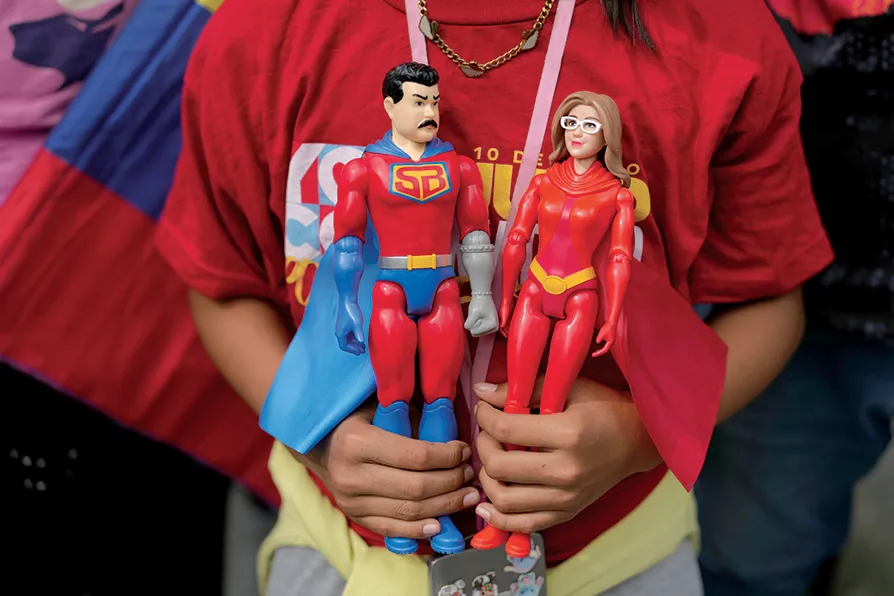The Gaza Tribunal is a vital step on the path to justice and accountability, writes RAMZY BAROUD
President Maduro mobilises the 4.5 million-strong Bolivarian National Militia in response to US ‘threats’, vowing to defend the country’s sovereignty and independence, DEVIN B MARTINEZ reports

 WHO’S YOUR HERO: A girl holds a dolls of Super Bigote/Super Moustache, Venezuelans’ affectionate nickname for their President Maduro, and Cilita doll, based on first lady Cilia Flores at support rally for the government last Tuesday in Caracas
WHO’S YOUR HERO: A girl holds a dolls of Super Bigote/Super Moustache, Venezuelans’ affectionate nickname for their President Maduro, and Cilita doll, based on first lady Cilia Flores at support rally for the government last Tuesday in Caracas
PRESIDENT Nicolas Maduro announced on Monday, that he is mobilising “over 4.5 million militia members across the entire national territory” of the Bolivarian Republic of Venezuela, in response to the US deployment of three navy guided-missile destroyers and 4,000 military personnel to the Caribbean.
The White House has described the deployment as an anti-drug-trafficking operation in the region, while some analysts have called it a new threat against Venezuela — the country with the largest oil reserves in the world.
The US military deployment comes after Washington raised its bounty on the Venezuelan president from $25 million to $50m, alleging links to drug cartels.
The “extravagant, bizarre and outlandish threats” of the US have been firmly rejected by the Venezuelan government.
The Minister of Foreign Affairs Yvan Gil described the accusations as a sign of desperation, revealing Washington’s “lack of credibility and the failure of its policies in the region.”
Gil also pointed out that Venezuela has made major gains against drug-trafficking after expelling the US Drug Enforcement Agency (DEA) — who many Venezuelans call “the planet’s chief drug-traffickers” — from the country in 2005.
No US agency or international body has produced concrete evidence of drug production and distribution being concentrated in Venezuela or linked to Maduro. In fact, available global drug data makes almost no mention of the Caribbean nation or the alleged “Cartel of Suns” at all.
According to the UN Office on Drugs and Crime (UNODC), the epicenter of activity is in Colombia, Ecuador and Peru, with the US identified as the main destination for distribution, recording the highest level of drug consumption in the world.
UNODC data reports that only 5 per cent of Colombian drugs transit through Venezuela, and that the country is free of coca leaf cultivation and marijuana and cocaine processing.
The Trump administration, on the other hand, has maintained its position that the Venezuelan government is a “narco-terror cartel.”
Last week, mass protests across Venezuela denounced the “interventionist policies of the US government” following the bounty increase on Maduro and the accusation of cartel ties.
However, US Secretary of State Marco Rubio confirmed the deployment of US troops to the region on August 14. On Tuesday, August 19, White House Press Secretary Karoline Leavitt was asked if the administration was open to “boots on the ground” in Venezuela, to which she responded, “[Trump] is prepared to use every element of American power to stop drugs from flooding into our country.”
This week, Venezuela’s “prepared, activated and armed” militia members are being deployed “throughout the entire territory, and meticulously, sector by sector,” as part of what the government is calling a peace plan to defend the principles of sovereignty and shared economic development.
“The Bolivarian National Militia is the people in arms, it is the genuine expression of civic-military union,” said Maduro in 2019, as he announced the incorporation of the militia that Hugo Chavez created — which has surged to nearly five million members, according to the government — into the armed forces as an official “combat unit.”
“We are also deployed throughout the Caribbean,” Venezuela’s Interior Minister Diosdado Cabello reminded the public. “Our sea, which is Venezuelan territory.”
The Venezuelan government is not alone in speaking out against the escalation of tensions in the Caribbean. When asked about the US military deployment during a regular press conference, President Claudia Sheinbaum said Mexico’s message to the region is: “No to interventionism. This is not just a conviction, it’s in the constitution.”
To this day, the US does not recognise President Nicolas Maduro as the winner of the July 28 2024 elections in Venezuela, claiming that opposition figure Edmundo Gonzalez is the true president.
In the months following the election, Washington targeted dozens of officials in the Venezuelan National Electoral Council and other government departments with sanctions and visa bans, on top of the long-standing US economic blockade of the Bolivarian nation.
Despite the mounting pressure, Venezuelan officials are confident that the nation can defend its sovereignty. “It’s not about Maduro, it’s about the ordinary people, the people in the neighborhoods, the communities,” says Nahum Fernandez, head of government of the capital Caracas.
“This country belongs to Venezuelans; in the face of any threat, the Venezuelan people will not remain silent.”
This article first appeared in at peoplesdispatch.org.










